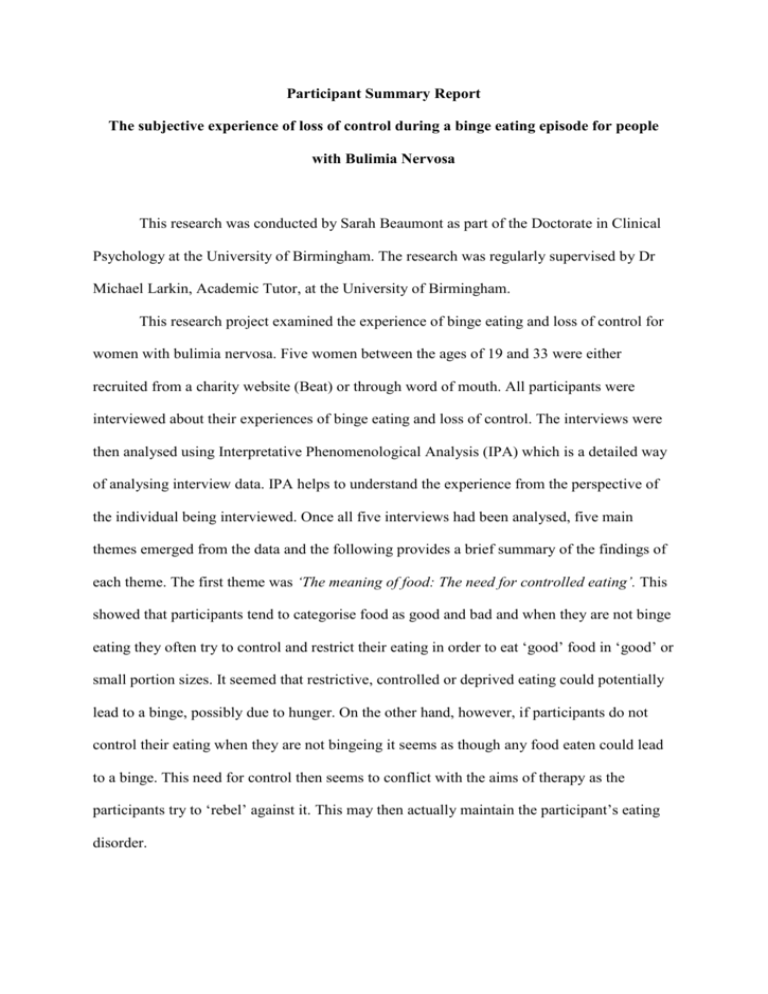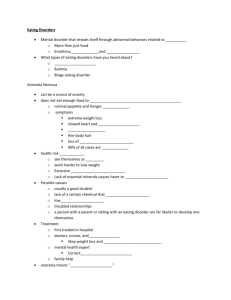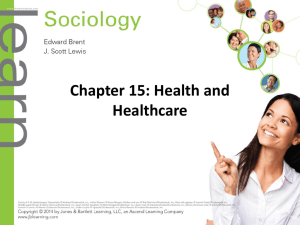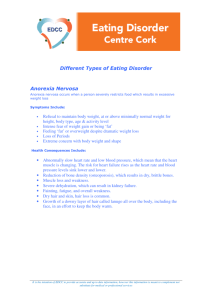Participant Summary Report The subjective experience of loss of
advertisement

Participant Summary Report The subjective experience of loss of control during a binge eating episode for people with Bulimia Nervosa This research was conducted by Sarah Beaumont as part of the Doctorate in Clinical Psychology at the University of Birmingham. The research was regularly supervised by Dr Michael Larkin, Academic Tutor, at the University of Birmingham. This research project examined the experience of binge eating and loss of control for women with bulimia nervosa. Five women between the ages of 19 and 33 were either recruited from a charity website (Beat) or through word of mouth. All participants were interviewed about their experiences of binge eating and loss of control. The interviews were then analysed using Interpretative Phenomenological Analysis (IPA) which is a detailed way of analysing interview data. IPA helps to understand the experience from the perspective of the individual being interviewed. Once all five interviews had been analysed, five main themes emerged from the data and the following provides a brief summary of the findings of each theme. The first theme was ‘The meaning of food: The need for controlled eating’. This showed that participants tend to categorise food as good and bad and when they are not binge eating they often try to control and restrict their eating in order to eat ‘good’ food in ‘good’ or small portion sizes. It seemed that restrictive, controlled or deprived eating could potentially lead to a binge, possibly due to hunger. On the other hand, however, if participants do not control their eating when they are not bingeing it seems as though any food eaten could lead to a binge. This need for control then seems to conflict with the aims of therapy as the participants try to ‘rebel’ against it. This may then actually maintain the participant’s eating disorder. The second theme was called ‘Embodied and contextual accounts of bingeing’ which gave an indication of the things the participants thought might lead to a binge. In this theme the participants included things such as the experience of positive and negative emotions, the urge to binge, the desire to binge and the enjoyment they get from bingeing. In addition to this, participants all said they prefer to be alone when they binge and binge eating usually, but not exclusively happens in the evening. The data collected by the participants in this theme is well supported by the literature with the exception of the presence of positive emotions experienced before a binge eating episode. Further research is required to understand the role of positive emotions during binge eating. The third theme was regarding the binge itself. It was called ‘(During the binge) the point of no return’ which showed that once a participant starts eating a large amount of food they find it difficult to stop and become uncomfortably full. This seems to be the point when they lose control and the situation cannot be repaired without eating enough to purge afterwards. Within this theme, the participants also talked about the nature of the binge itself. They described it as frantic, eating quickly in order to get the binge ‘over and done with’, although for some eating quickly had also become a habit. The participants also describe a determination to eat as much food as possible, even if they are interrupted. The fourth theme explored the experience of loss of control specifically and was called ‘Shifting in and out of a dissociative state’. It seemed that loss of control served two functions. Firstly, it was described as ‘controlled loss of control’, in that by making the decision to binge eat, participants were allowing themselves to lose control. This could be as a response to being over-controlled at other times, which could potentially be quite tiring for the individual to maintain, possibly resulting in the desire to binge. The second function of loss of control seemed to be to remove themselves from the experience of the binge itself. This is known as dissociation and the findings seem to suggest that, at times, most participants had experienced an absence of conscious awareness during a binge. This means they do not have an awareness of their surroundings or what they are doing at this time. They seem to do this to both avoid the unpleasant or unmanageable feelings which have led to a binge and because the experience of binge eating itself is unpleasant. By bingeing without awareness they do not have to experience the unpleasantness of the binge or the feelings associated with it. This finding is supported by existing research. However, in the current study, the participants also talked about binge eating times when they were aware of what they were doing and were able to make decisions about whether to continue eating or not. This suggests that the participants can shift in and out of this dissociative state which is a new finding in the literature. Finally the fifth theme concentrates on ‘The negative consequences of bingeing’. This theme highlights both the emotional and general consequences of binge eating for the participants, which were most commonly negative. Some of the consequences listed here include, loneliness, sadness, guilt, shame, feeling bad, embarrassment, anxiety, taking other’s food, making excuses to be alone (sometimes lying to others) and the physical toll on the body associated with binge eating. These findings are well supported in the literature. Overall, the participants’ accounts of restrictive or controlled eating, their feelings and urges immediately prior to a binge and the negative consequences afterwards are all well supported by the literature. The current findings, therefore add to the findings of existing research. There is already evidence which suggests that people with bulimia nervosa experience dissociation and again the current findings contribute to this evidence. What is interesting about the current study is the finding that participants can seemingly shift in and out of their dissociative state (lack of awareness). This could be an important factor in the treatment of bulimia nervosa, particularly in supporting individuals to understand the role of loss of control in their binge eating. As individuals bring themselves back into conscious awareness they could be supported to remain aware of their surroundings and feelings. By sitting with the feelings that individuals with bulimia nervosa find most uncomfortable they can learn to manage them without the need to binge eat. This would be an interesting topic for further research in the future.





